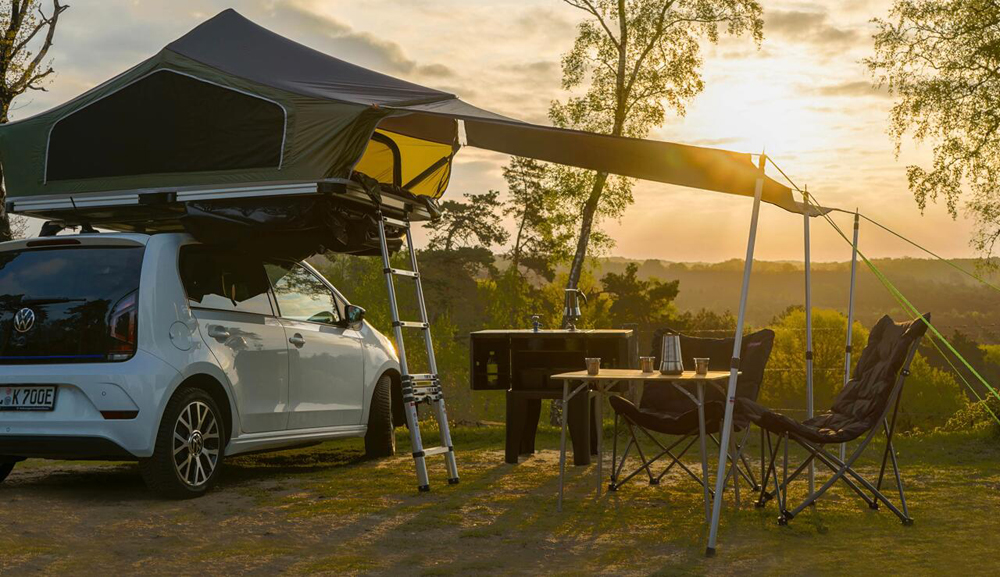- E-mail: info@sundaycampers.com
- Tel.: +86 15801504548
The freedom of a rooftop tent is liberating. You can camp anywhere you can get your car, be it a campsite or alone in nature. It is not always certain where you will be spending the night on an adventurous road trip. Will you head for a campsite, or would you rather camp wild?

Most campsites allow camping with a car and a rooftop tent. Rooftop tent camping at a nice campsite can be amazing. Many campsites are in beautiful locations and have good sanitary facilities. Particularly for families with young children, it can be nice to have access to good toilets, showers, a shop and Wi-Fi, and other facilities such as a swimming pool or playground.
Some countries are still unfamiliar with rooftop tents. Campsites may try to give you a camper pitch, but once you explain how it works, getting a regular pitch between the ground tents is usually not a problem. Regular pitches are often a little more spacious and nicer to camp on. Some campsites prefer not to have cars on the pitches, but they will often allow it when you explain that you have a rooftop tent.
There are some places where rooftop tents are not allowed. Always check whether a certain camper pitch—or “Aire”—(e.g. in a city) also allows cars with rooftop tents. A car with a rooftop tent may feel like a camper, but it usually isn’t in the eye of the law and regulations. Laws and regulations are different in many countries and for many spots. There are plenty of amazing free or paid locations where you can stay the night with a rooftop tent. For example, in Norway or Sweden, there are beautiful places where you are allowed to stay, even on a camper pitch. When dealing with Aires, it is always good to read up on the local regulations.
The legislation differs per country, and the rules are not always clear. Camping regulations can even vary between regions, areas or cities. In many countries where wild camping is illegal, you can still camp in nature on privately owned land (with the owner’s permission). Fortunately for nature lovers, there is a lot of privately owned land in Europe.
The following is the information we have found. No rights may be derived from this information. Always check whether you can camp somewhere and whether it is safe.
● Belgium:
wild camping is forbidden, but sleeping in your vehicle is permitted for up to 24 hours in parking spaces, even along motorways.
● Denmark:
wild camping is forbidden, but you can camp on privately owned land with the owner’s permission.
● Germany:
wild camping is forbidden, but sleeping in your vehicle is permitted for up to 24 hours in parking spaces, even along motorways.
● France:
wild camping is only permitted with the land owner’s permission or the police. You can also stay in official parking spaces for up to seven days.
● United Kingdom:
wild camping is only permitted with the land owner’s permission (e.g. on the grounds of a farm or manor or next to a restaurant or pub).
● Ireland:
wild camping is only permitted with the permission of the landowner (e.g. on the grounds of a farm or manor or next to a restaurant or pub). You can also stay in official parking spaces for up to 24 hours.
● Estonia:
wild camping is permitted outside of national parks.
● Finland:
wild camping is very common. Many parks are also well equipped for it. For example, there are handy facilities everywhere, such as fire pits or communal barbecue areas that everyone can use for free.
● Iceland:
wild camping is only permitted with the land owner's permission.
● Latvia:
wild camping is permitted outside national parks and privately owned land.
● Lithuania:
wild camping is permitted outside national parks and privately owned land.
● Norway:
wild camping is permitted on non-enclosed terrain and at least 100 metres from houses. You can stay in the same spot for up to three days.
● Sweden:
wild camping is generally permitted in nature and along the road. Note that different rules may apply to certain areas or on islands.
● Italy:
wild camping is only permitted with the land owner’s permission, provided it is at least 1 km outside built-up areas, within 50 metres of a national road and not within 100 metres of a monument.
● Morocco:
wild camping is permitted.
● Spain:
wild camping is permitted under certain conditions. It is not allowed in national parks.
● Albania:
wild camping is permitted almost everywhere. You can also stay overnight in a parking space. It is not allowed in national parks.
● Croatia:
wild camping is only permitted with permission from the local authorities or the police.
● Poland:
wild camping is forbidden. You can camp on privately owned land with the owner’s permission.
● Romania:
wild camping is forbidden. You can camp on privately owned land with the owner’s permission. Wild camping is also permitted with the permission of the local authorities or the police.